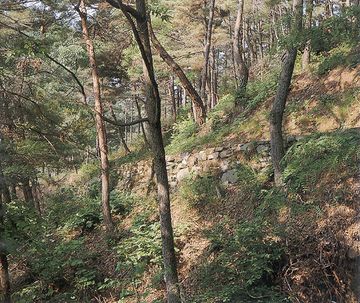경주 남산신성
| 경주 남산신성 Namsansinseong Fortress, Gyeongju |
|
 경주 남산신성, 국가문화유산포털, 문화재청. |
|
| 대표명칭 | 경주 남산신성 |
|---|---|
| 영문명칭 | Namsansinseong Fortress, Gyeongju |
| 한자 | 慶州 南山新城 |
| 주소 | 경북 경주시 인왕동 산56번지 외 10필 |
| 지정(등록) 종목 | 사적 제22호 |
| 지정(등록)일 | 1963년 1월 21일 |
| 분류 | 유적건조물/정치국방/성/성곽 |
| 시대 | 신라 |
| 수량/면적 | 7,268,982㎡ |
| 웹사이트 | 경주 남산신성, 국가문화유산포털, 문화재청. |
|
|
|
해설문
국문
경주 남산의 북쪽편에 있는 남산신성은 비교적 야트막한 산봉우리와 계곡을 이어 쌓은 성으로 왕성인 월성(月城)과 경주평야가 내려다보이는 곳이다. 성의 전체 둘레는 2,854보(步)로 4,850m이다. 북쪽의 북형산성(北兄山城), 동쪽의 명활성(明活城), 서쪽의 서형산성(西兄山城)과 함께 남쪽에서 서라벌을 지키던 중요한 산성이었다.
신라 진평왕 13년(591)에 성을 쌓았다고 하고, 문무왕 19년(679) 성을 크게 고쳐 쌓았는데, 지금 성벽이 잘 남아있는 부분은 문무왕 때 것으로 보인다. 삼국유사에는 성 안에 큰 창고 2개를 짓고 무기와 군량미를 저장해 전쟁에 대비하였다고 하는데, 지금은 3곳에 창고 터가 남아있다.
성 부근에서 여러 기의 남산신성비(南山新城碑)가 발견되었다. 이 비문에는 `전국에서 사람들이 모여와 일정한 길이의 성벽을 맡아 쌓았으며, 만일 3년 이내에 성벽이 무너지면 벌을 받을 것'이라는 서약의 글과 함께 성을 쌓는데 참여한 사람들의 벼슬·성명·출신지가 새겨져 있다. 성의 축성기록일 뿐 아니라 신라의 지방통치체제를 보여주는 중요한 자료이다.
영문
Namsansinseong Fortress, Gyeongju
This fortress, located around a low peak and valley at the northern end of Namsan Mountain, overlooks the Gyeongju Plain and was one of the four fortresses that defended the ancient capital of the Silla kingdom (57 BCE-935 CE), together with Bukhyeongsanseong in the north, Myeonghwalseong in the east, and Seohyeongsanseong in the west
The fortress was built in 591 and renovated in 679. The current wall, which measures 4.85 km in length, dates to the 7th-century renovation. According to the Memorabilia of the Three Kingdoms (Samguk yusa), two storehouses were established inside the fortress in 663 which held weapons and food provisions in case of war, however excavations revealed three storehouse sites.
In the vicinity, nine monuments were found relating to the fortress’s construction, all with the same inscription. They state that “People from all over the country gathered and were given a fixed length of the wall to build. If the wall falls down within three years, then those responsible shall be punished.” The monuments also list the rank, name, and hometown of the people involved. Not only are these monuments useful as a historical record about the construction of the fortress, but also give insight into the regional governance system of the Silla kingdom.